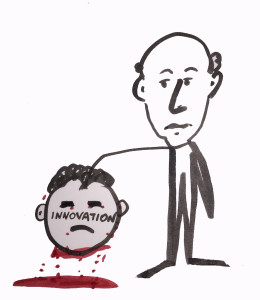A Culture of Incivility Harms USA Innovation
 Five Ways Incivility “Decapitates” Innovation
Five Ways Incivility “Decapitates” Innovation
The recent flap around Kathy Griffin’s posting a picture of a fake severed head, of our President, was a sad attempt at humor, but incredibly successful at provocation.
It has brought up the discussion, once again, of the civility of our discourse in America. I think Tiffany Quay Tyson does a nice job of summing up how many people are reacting to the Griffin incident, and the subsequent howls of reaction.
No matter your political persuasion, civil discourse, and it’s close cousins, politeness, gentility, tolerance, compassion, and good manners have slipped far from where we once were.
Those who keep track of civility are in agreement about the downslide. I’m not interested in arguing the point, who started it, or, which side of the aisle is worse. It goes beyond politics. Simple behaviors like cutting lines, yelling at people while in your car, treating people poorly, and flaming folks on FB — they indicate that politics is only reflecting a broader cultural tendency towards more incivility.
Here’s the bottom line: incivility harms innovation, long term and short, business and personal.
Five ways a lack of civility negatively impacts innovation:
- Teams: Innovation of all kinds is done by teams and rarely by individuals. Team members have to work together to get things done, and, a lack of civility puts people in unproductive conflict, and more often. In order to be productive teams need to get past conflict (see Tuckman model). So, teams are less effective and the result is less innovation.
- Bubbles: Diversity of thinking boosts the quantity and quality of creative output. In an uncivil world, people avoid those who don’t think as they do. Insular bubbles of “same think” people are created and those bubble groups have less creative ideas — because they have less thinking to combine. The result is less innovation, or, groups settling for incremental, not breakthrough, innovation.
- Government Efficiency: The government plays a big role in setting the table for corporate innovation. The results the USA has gotten from government programs, like NASA, has led to new industries and commercial success stories. Funding, and doing, deep research in science and technology pays off in the long run. As our federal government becomes more dysfunctional and less focused on problem solving, they get less done. Funding for important research gets put off or cancelled, and this will, in the long run, lead to less innovation. Of course, incivility is not the only reason research is not getting funded.
- Tolerance for Creatives: Creative people are sometimes not mainstream in their beliefs and behaviors (and I admit some are conventional and not stereotypical “creatives”). Steve Jobs, Thomas Edison, and many others were complex characters, and for those people to create something important, a lot of tolerance is needed. With less tolerance for different views, be they political or otherwise, our crazy geniuses will be fired, or, won’t get nearly as much done. Again, less innovation is the result.
- Customers: Organizations that have uncivil cultures reflect that to their customers and suppliers. If your co-workers are rude to you, your unhappiness is likely to spill over when facing customers. Even a single incident of rudeness is enough to turn away a customer of many years. This is more of an income impact, but without income, an organization can’t invest in…innovation.
So, folks, let’s keep our heads on, and start acting like nice people. Innovation needs you to behave that way.



3 responses to “Five Ways Incivility Decapitates Innovation”
Fantastic.
Say more if you have time Dave.
[…] Five Ways Incivility Decapitates Innovation Gregg Fraley Blogg […]